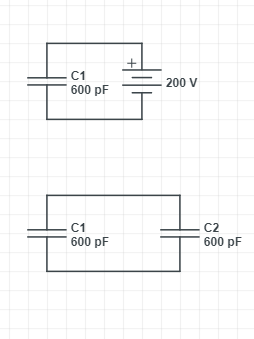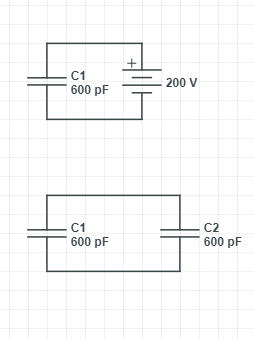Question
Question: A 600pF capacitor is charged by a 200V supply. It is then disconnected from the supply and is connec...
A 600pF capacitor is charged by a 200V supply. It is then disconnected from the supply and is connected to another uncharged 600pF capacitor. How much electrostatic energy is lost in the process?
Solution
Hint: Here the capacitor gets charged first and then gets discharged when connected to another uncharged capacitor. Thus there is loss in energy. Here the capacitors are connected in series. We know that the energy of the capacitor is E=21CV2
Formula used: the energy of the capacitor is E=21CV2
Cnet1=C1+C1
Complete step-by-step solution -
A capacitor is a two terminal component that stores electrical energy, and later discharges them. This property is called the capacitance of the capacitor.
We know that the energy of the capacitor is E=21CV2 ,where C is the capacitor and V is the potential difference.

Here C=600pF and V=200V
Then E=21×(600×10−12)×(200)2
E=1.2×10−5J

When the capacitor is disconnected and connected to the uncharged capacitor, the net capacitance Cnet1=C1+C1=6001+6001=6002=3001
Cnet=300pF
Then the new energy is given by E′=21CnetV2
E′=21×(300×10−12)×(200)2
E′=0.6×10−5J
The difference in energy is =E−E′
=1.2×10−5−0.6×10−5=0.6×10−5=6×10−6J
Therefore the loss of energy is 6×10−6J
Additional Information:
A capacitor can store electrical energy, and behaves as a temporary battery. They are used mainly to maintain the power supply while batteries are being changed. It can also store information in the form of binary digits. It is the main component used in full wave and half wave rectifiers. SI unit of capacitor is farad (symbol: F), named after the English physicist Michael Faraday. A 1 farad capacitor, when charged with 1 coulomb of electrical charge, has a potential difference of 1 volt between its plates. The series of capacitors is the sum of reciprocal of its individual capacitors, whereas in resistance the parallel is the sum of reciprocal of its individual resistors. Also remember that capacitors can charge and discharge.
Note: The series of capacitors is the sum of reciprocal of its individual capacitors, whereas in resistance the parallel is the sum of reciprocal of its individual resistors. Also remember that capacitors can charge and discharge.
